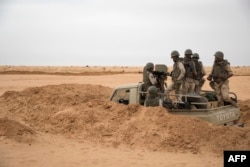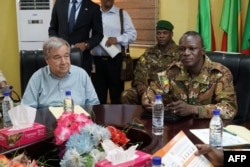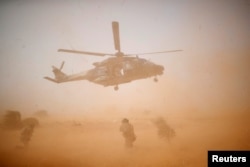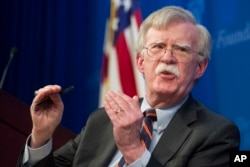The G5 Sahel force, a joint force of five Sahel region countries tasked with fighting militants including Boko Haram and al-Qaida among others, is struggling with funding and lacks coordination among member states, which some officials and analysts warn has undermined its counterterrorism mission.
“The biggest concern with the future of G5 Sahel is inadequate resourcing and support from a major power in the region,” Seth Jones, director of transnational threats at the Washington-based Center for Strategic and International Studies (CSIS), who closely monitors developments in the region, told VOA.
“None of the G5 countries have sufficient money or competence by themselves or even in cooperation to do what is necessary to significantly weaken terrorist groups in the region,” Jones added.
Mahamadou Nimaga, Mali’s ambassador to Washington, however said that while funding is an issue, there are other challenges, as well.
“Terrorism cannot only be defeated by security and military actions. We have to come up with coherent and realistic programs that link security and development. We need to be efficient on development and governance issues, fighting terrorism is a matter of balancing short-, medium- and longer-term perspectives,” Nimaga said.
He added that the military initiative has to be united with development projects to prevent communities from falling to the influence of extremists in the region.
G5 force
In order to crack down on militant groups in the region, five countries, Niger, Chad, Mali, Burkina Faso and Mauritania, established the G5 in 2014, which is a 5,000-person military and police force, tasked with carrying out counterterrorism operations along the common border regions of all five countries.
Since then, the force has not been fully operational because of funding and logistical issues.
In May, while on a visit to Mali, the country most affected by terrorism among the G5, U.N. Secretary-General Antonio Guterres appealed to donors to provide more sustainable support.
“The international community must understand the need to provide the G5 Sahel countries with predictable support,” Guterres said at the time.
Antoine Leory, a senior adviser to the G5 Sahel Council of Ministers acknowledged the funding and logical issues but said partner countries have already taken measures and it is just a matter of time before the assistance is received.
“What is missing at the moment are means of travel (vehicles, fuel), intelligence and transmission, but these means are on their way. The funding promised by the G5S partners is taking time to materialize due to the procedures implemented,” Leory said.
Other challenges
Leory added that donor countries have pledged about 2.3 billion euros during a conference of partners and donors held earlier this month in Mauritania’s capital of Nouakchott.
He, however, said that the force faces other challenges.
“There are difficulties and constraints, the operational area is immense, the climate difficult and the resources limited. In addition, there is a need to coordinate between five countries, with UNMISMA [The United Nations Multidimensional Integrated Stabilization Mission in Mali, a UN peacekeeping mission] in Mali and with the Barkhane force [French troops] throughout the area,” Leory said.
The G5 Sahel force continues to face security challenges in the region from several groups including Boko Haram, Islamic State and al-Qaida.
“I don’t think military efforts ever are sufficient to combat Islamic State, al-Qaida and other militant groups in the region. The primary focus needs to be building an effective government that can deliver services to their population and can provide basic security and order in an area they can control,” CSIS’s Jones said.
Pillars
Some analysts claim that the G5 Sahel force’s original mandate has had several pillars that overtime have been reduced to only counterterrorism and there is a need to revisit those pillars.
“The four pillars are to combat terrorism, drug trafficking, contribute to the restoration of state authority, the return of displaced persons and refugees, facilitate humanitarian operation, and finally to contribute to the implementation of Development strategies in the G5 Sahel region,” Alix Boucher, an assistant research fellow at the Africa Center for Strategic Studies, told VOA
Boucher said that the G5 is struggling to implement these pillars.
“I think clearly the lack of funding operational capacity is making all four of the pillars complicated and multifaceted areas difficult. The G5 Sahel force still suffers from a lack of sufficient funding to be completely operational,” she added.
U.S. support
Concerns over lack of funding for G5 Sahel force comes at a time when the U.S. is changing its policy on the continent.
Earlier this month, White House National Security Adviser John Bolton said the U.S. is reallocating its forces and resources from U.N. peacekeeping missions across Africa to other priorities in line with U.S. national security and economic interests in the region.
Announcing the administration’s new Africa Strategy Dec. 13 during a speech at the Washington-based Heritage Foundation, Bolton said the U.S. would no longer support “unproductive, unsuccessful and unaccountable U.N. peacekeeping missions.”
However, Bolton praised the work of the G5 Sahel force and the U.S. Africa Command announced in November that it is increasing support for the G5 mission.
“Since our initial pledge of $60 million in October 2017, U.S. assistance has nearly doubled to approximately $111 million to meet the needs and strengthen the capabilities of the G5 Sahel Joint Force,” Nate Herring, a spokesman for U.S. Africa Command, said.
The United States is the U.N.’s top peacekeeping donor, providing nearly a third of its $6.7 billion budget for the fiscal year July 1, 2018, to June 30, 2019.
VOA's Pentagon Correspondent Carla Babb contributed to this report.








